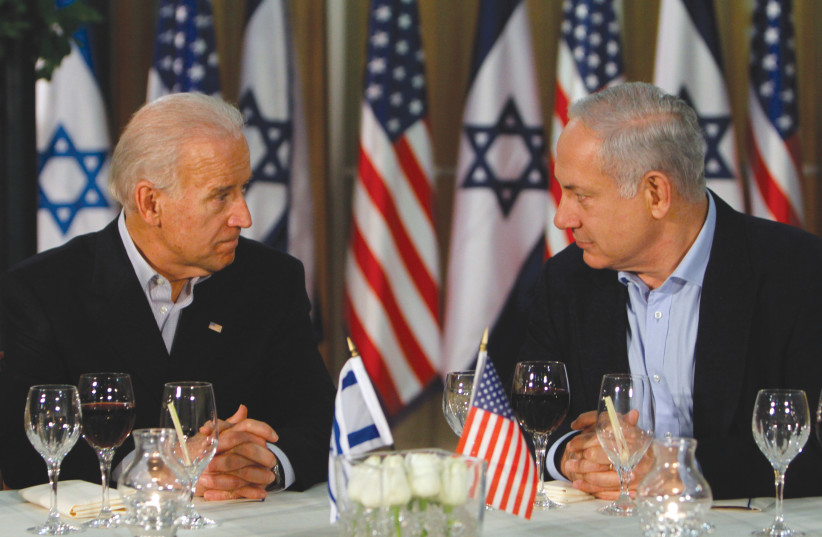US President Joe Biden this week issued his harshest-ever rebuke of the Netanyahu government, warning that “Israel can’t continue down this road” – referring to judicial reform proposals and other supposedly “anti-democratic” legislative initiatives. “I hope that he [Prime Minister Benjamin Netanyahu] walks away from it,” Biden said, adding that he has no plans to invite Netanyahu to the White House “in the near term.”
Alas, in the coming days, we may hear White House and State Department spokespeople increasing the pressure on Netanyahu by pontificating further about the need to “protect democracy” and “eschew authoritarianism.”
These spokespeople will aver that “We believe respect for human rights, fundamental freedoms and a strong civil society are critically important for responsible and responsive governance,” implying Israel does not share that belief because it recently outlawed six Palestinian terrorist-backed NGOs and because the judicial reform juggernaut would drawback some (self-arrogated) Israeli Supreme Court powers.
Then they will segue into sermons against the expansion of settlements, “which are completely inconsistent with efforts to lower tensions and to ensure calm, and which damage the prospects for a two-state solution...,” or something like that.
And at the first sign of Israeli army and police action against Palestinian rioters in Jerusalem or the West Bank – violence that, alas, is quite predictable over the course of the current Ramadan period given the disintegration of the Palestinian Authority and the penchant of radical Islamic groups to cash in on the PA’s failings and on perceived Israeli weakness – the Biden administration will pounce on Israel again.

White House and State Department spokespeople will call “on all parties” to halt the violence but make it clear that Washington views Israeli security operations as particularly inflammatory and “disproportionate.”
Then they will again start nattering about a possible re-opening of the US consulate in Jerusalem, which essentially would be an embassy to the Palestinian Authority. (This consulate was closed by the Trump administration when it recognized Israel’s full sovereignty in Jerusalem and moved the US Embassy to Jerusalem from Tel Aviv.)
Why is the Biden administration involving themselves in Israeli matters?
WHY IS the Biden administration hounding Israel on these matters? Why neigh about a completely internal Israeli matter like judicial reform, or about Jerusalem, Palestinians and settlements when even the least pro-Israel officials in the administration know that the obstructionist Palestinian Authority deserves absolutely no awards from Washington and that there is no realistic peace process in the offing?
What advantage does Washington gain in the much-more important struggle in the Middle East – the grand strategic competition the US faces against Chinese expansionism and Russian aggrandizement – by beating up on its critical security partner Israel?
Is this because Biden truly fears for the purity of democracy in Israel? There may be some element of this at play, but in my view, the broader explanation for the current escalation in US-Israel tensions is American capitulation to Iran.
Biden sparing Iran?
Biden is signaling to Netanyahu: Shut up about Iran’s nuclear bomb, and don’t you dare attack Iran, or else the US will make your life miserable on many other fronts.
In other words, Biden is braying about judges, judicial reform, Jerusalem and the judicious use of force in the territories mainly to force Netanyahu into submission regarding Iran.
MAKE NO mistake about it. Biden is not going to act against Iran – despite Iranian attacks on US troops and other targets in the Gulf, despite its expanded production and export of military attack drones (including to Russia for use in Ukraine), and despite Iran’s continued construction of an anti-American axis in the Mideast.
Biden is closer than ever to acquiescing to Tehran – despite Iranian enrichment of uranium to near-bomb-ready levels (84% according to the IAEA, which is very close to the 90% level necessary for a nuclear weapon), despite its accumulation of weapons-grade uranium for an estimated five nuclear weapons within three months, and despite Biden’s pledge that he will never allow Iran to acquire a nuclear weapon.
The chairman of the US Joint Chiefs of Staff, Gen. Mark A. Milley, said at a congressional hearing last week that the US “remains committed, as a matter of policy, that Iran will not have a fielded nuclear weapon.” Notice the new term “fielded.” This suggests the Biden administration is now prepared to tolerate nuclear weapons in Iran’s hands, provided the weapon is not “fielded,” in other words, deployed.

This is a dramatic shift in administration policy – from a strategy of nuclear weapons denial to a much softer position of preventing Iranian nuclear weapon deployment but not their production. Almost nobody has noticed this astounding downgrade in US policy on one of the biggest global security issues!
The reference to “a fielded nuclear weapon” makes it clear that Biden will not use force to stop Iran from breaking out of its nonproliferation commitments and producing one or more nuclear weapons. He just wants the Iran nuclear file off his agenda and out of the way – in other words, he seeks to kick the can down the road.
The Biden administration is certainly not going to let Israeli or other critics get in its way. It does not want Israel to strike at Iran. The best route to ensuring Israeli compliance with US policy on Iran, in practice if not in declaration, is by threatening US distancing from Israel on matters of “democratic principle” or on matters relating to the Palestinians.
WHAT IS particularly sad here is that there are ways of halting Iran’s inexorable march towards a nuclear bomb and towards regional hegemony without necessarily arriving at war.
In an important article published this week in Newsweek, two top Israeli security experts (Meir Ben-Shabbat of the Misgav Institute for Zionist Strategy & National Security, and Eran Lerman of the Jerusalem Institute for Strategy & Security) argued that a credible US military threat against the regime of the ayatollahs would reduce the risk of actual war. It also could reverse the drift of regional players towards Russia and China. Without such a US threat, the likelihood of a violent eruption in the Middle East will significantly increase, they say.
A real Biden administration road map for countering Iran would include the following, according to Ben-Shabbat and Lerman: Snapback sanctions on Iran with tight supervision (especially of Iranian oil exports and dual-use technologies); terrorist designation of the IRGC across Europe; suspension of Iranian membership in international forums; sanctions and economic pressure on individuals and organizations involved in repressing human rights; penalties on key Iranian industries; covert disruptive measures against Iran’s nuclear program; and most saliently, articulation and demonstration of a credible military threat against the Iranian regime.
Making this even more precise, Mark Dubowitz and Orde Kittrie of the Foundation for the Defense of Democracies in Washington have outlined more than 200 specific measures (in the military, cyber, financial, energy, legal and diplomatic spheres) that US government agencies can take in “deploying multiple elements of national power” to confront threats from the Islamic Republic of Iran.
Taken together, these measures will enhance American deterrence and prevent war. They will obviate the need for Israel to strike Iran. Alas, President Biden prefers to make allowances for Iran and reprimand Israel; to spare the ayatollahs and scold Netanyahu.
The writer is a senior fellow at the Misgav Institute for Zionist Strategy and National Security. The views expressed here are his own. His diplomatic, defense, political, and Jewish world columns over the past 26 years are archived at davidmweinberg.com.
